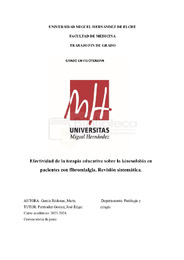Título :
Efectividad de la terapia educativa sobre la kinesofobia en pacientes con fibromialgia. Revisión sistemática. |
Autor :
García Ródenas, Marta |
Tutor:
Ferrández Gómez, José Edgar |
Editor :
Universidad Miguel Hernández |
Departamento:
Departamentos de la UMH::Patología y Cirugía |
Fecha de publicación:
2024-06-01 |
URI :
https://hdl.handle.net/11000/33581 |
Resumen :
Introducción: la fibromialgia (FMS) es una afección crónica caracterizada por dolor crónico generalizado, alteración del sueño y fatiga, entre otros. La educación al paciente se recomienda como tratamiento de primera línea para las personas que sufren esta dolencia.
Objetivos: Analizar la evidencia científica disponible acerca de la efectividad de la terapia educativa sobre la kinesiofobia en pacientes con fibromialgia. Examinar las herramientas de medición sobre la variable de estudio. Analizar los programas de educación empleados. Describir los resultados obtenidos.
Material y métodos: se llevó a cabo una revisión sistemática, utilizando la estrategia PICOS para formular la pregunta de investigación. Las bases de datos utilizadas para las búsquedas fueron: Pubmed, Cochrane Library, Scopus, Web of Science y Biblioteca Virtual en Salud (BVS). Se usaron diferentes términos Mesh y términos libres para confeccionar las búsquedas. Solo se incluyeron en la revisión ensayos clínicos aleatorizados (ECAs).
Resultados: la revisión incluyó cuatro estudios, de los cuales tres no mostraron mejoras significativas. Aún así, los programas educativos obtuvieron mejores puntuaciones de kinesiofobia que los controles.
Conclusión: Los resultados de la revisión no han sido concluyentes. No se ha podido determinar un tratamiento educativo tipo basado en la evidencia que mejore la kinesiofobia en pacientes con fibromialgia. Se necesita más evidencia al respecto para llegar a conclusiones de más peso.
Introduction: Fibromyalgia (FM) is a chronic condition characterized by widespread chonic pain, sleep disturbance, and fatigue, among others. Patient education is recommended as a first-line treatment for people suffering from this condition.
Objectives: Analyze the available scientific evidence about the effectiveness of educational therapy on kinesiophobia in patients with fibromyalgia. Examine the measurement tools on the study variable. Analyze the education programs used. Describe the results obtained.
Material and methods: a systematic review was carried out, using the PICOS strategy to formulate the research question. The databases used for the searches were: Pubmed, Cochrane Library, Scopus, Web of Science (WOS) and Biblioteca Virtual en Salud (BVS). Different Mesh terms and free terms were used to create the searches. Only randomized clinical trials (RCTs) were included in the review.
Results: The review included four studies, of which three did not show significant improvements. Still, the educational programs had better kinesiophobia scores than the controls.
Conclusion: The results of the review have been inconclusive. It has not been possible to determine a type of evidence-based educational treatment that improves kinesiophobia in patients with fibromyalgia. More evidence is needed in this regard to reach stronger conclusions.
|
Palabras clave/Materias:
fibromialgia
terapia educativa
kinesiofobia
educación en neurociencias del dolor |
Área de conocimiento :
CDU: Ciencias aplicadas |
Tipo de documento :
info:eu-repo/semantics/bachelorThesis |
Derechos de acceso:
info:eu-repo/semantics/openAccess
Attribution-NonCommercial-NoDerivatives 4.0 Internacional |
Aparece en las colecciones:
TFG - Fisioterapia
|
 La licencia se describe como: Atribución-NonComercial-NoDerivada 4.0 Internacional.
La licencia se describe como: Atribución-NonComercial-NoDerivada 4.0 Internacional.
.png)
